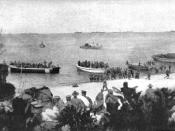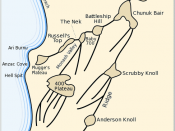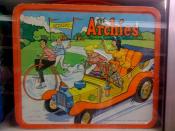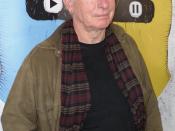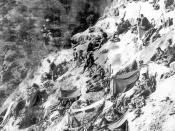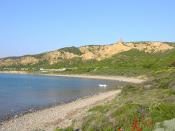Gallipoli By Eric Evans Watch Gallipoli and note the information which the film provides about: The Attitudes of the two main characters: At the beginning of the film"æ At the beginning of the film, the two main characters, Frank and Archie had completely different views towards the war. Archie was very keen to go to war, so much that he ran away from home to get in, and when he couldn't because of his age, he travelled to Perth, halfway on foot just to sign up. Frank, on the other hand was not at all interested in fighting for his country. All of his friends left him to go to war and he stayed put, more interested in running a bike shop in Perth. A few incidents such as the excessive praising of Archie for wanting to sign up for war started to change Franks values.
In Egypt"æ After signing up to the infantry, Frank was having a great time in Egypt.
He walked the town with mates, played football, made fun of Poms and paid little money for great pleasure. Franks views towards the war had changed completely. War was the best thing that had ever happened to him. Archie was also having a ball in Egypt, especially when he met up with Frank again. They had running races and lots of fun.
In the trenches in Gallipoli"æ The reality of war hit the two main characters quite hard. Archie was still eager to fight and rejected an offer to become runner , which would exempt him from going over the top. He admitted that he was scared but rarely showed it under his big grin. Frank was not as keen to fight, he commented that he was not looking forward to seeing a Turk. He graciously accepted the job of runner that he was better suited to. Frank gained a better understanding of what it was to defend his country.
Comparisons between the Australians and British: The film seemed to begrudge the British. The British landed at Suvla Bay, a much safer area than Anzac cove, and from there and from a ship, they ran the battle. They were said to be using the Anzacs as a diversion so that they could make a safer landing. While the Anzacs were fighting, the British would be drinking cups of tea on the beach. Many mistakes which lead to the withdrawal of the troops were caused by the British. The mistaken landing at Anzac Cove was caused by the British, the mistaken sighting of Australian flags in the enemy trenches was caused by the British and the late bombardments were caused by the British. The film was portraying the English as snobs who were using the Anzacs for their own glory.
The meaning of mateship and examples of this quality: Mateship is an Aussie word derived from the quality found in Aussies which involves loyalty, helpfulness, and trustworthiness towards mates. In the film many examples of mateship are shown; A strong sense of mateship held Archie and his Aboriginal friend together who really encouraged him to do well in his race. When Franks friend was unfairly priced for a phony antique, he and his mates out of loyalty and mateship, went to get his money back.
Positive and Negative images of Australians while overseas: In Egypt, the Aussies left many impressions on different types of people. They ran around like crazy making fun of the English commanders, leaving an anti-authoritarian impression and resulting in a rude comment from the English. Often they rudely rejected offers for sale from the Egyptians and they also paid 40c for prostitutes which left a bad impression on anybody who saw them. The Mateship between the Aussies left a good impression on the Egyptians and English.
The Use of Music: The music which was played many times was a fast beated eerie piece with the sound of machine guns in the background. This music was often played in momentsof tension or action.
What aspects of source 4.5.3 coincide with Weir's recreation of this event and what aspects differ? What viewpoint is Peter Weir trying to get across to the audience? A lot of the aspects in source 4.5.3 coincide with Peter Weir's recreation of the battle. Much of the factual information was recreated accurately. It was evident that the Trenches spread for about fifty metres and they were very close to the enemy trenches which were covered with machine guns. In the film, as stated in the paragraph, there were four lines of runners which went over the top and in each line was well over one hundred men. When the regiments went over the top, I think that Weir differed the actions of the men to what was stated in the paragraph. After witnessing the slaughtering of the first line, he showed a greater feeling of tension and fright amongst the men than was proved in the paragraph. By doing this, I think that Weir was trying to portray the natural human emotion of fear and show that the Anzac's were human just like any of us. The tactical warfare was also shown very similarly to that of the paragraph. Weir allowed the viewers to hear a bomb and then immediately either hear or see the runners going over the top and being shot down. The speech of the Commanding Officer of the last line was placed in the film but there was not a lot of shaking hands and interaction between the men as stated in the paragraph. I think that Weir reserved this section for a more emotional scene, with each man thinking of his family and putting aside his valuables. As mentioned in the paragraph, Weir included the fact that moves were made to halt the first line, but he went into more detail, making it a major theme of the film.
The film was an accurate re-creation of the events stated in the paragraph but minor changes were made to make it be more suited as a movie.
What aspects of the Anzac Legend are reinforced in the film, Gallipoli? From Gallipoli and the Egyptian training grounds, a judgment of the, "ÃÂTrue Australian' was made and that became the "Anzac legend"ÃÂ. The Aussie soldier who was brave, practical, resourceful, loyal and independent, but, was also anti-authoritarian. In Weir's film, the Anzac legend is re-inforced. For example in Egypt, when a soldier was unfairly overpriced for a phony antique, his loyal mates went to get his money back. The Bravery of the Australians was shown in that they would climb over the parapet and run across the nek knowing that their chances of survival were near to none. In the film, the Aussies proved to be anti-authoritarian. In Egypt they mocked the English Commanders, they didn't follow orders while training and in Gallipoli they often questioned authority's orders.
What are the similarities and differences between the first and last scenes of Gallipoli? What do you think Peter Weir wanted to achieve by this? The opening and closing scenes in the film were similar, but different in meaning. They both contained Archie running as fast a he could. They contained no audio but the sound of his feet and breath. The first scene was in WA and the second was on the nek in Gallipoli. The film finishes with a pause on Archie being shot in the chest.
In the first scene, Archie finishes his run with an excellent time, he could look forward to running in many important events to come, he was one of the best runners in Australia. In the final scene, he may have been running just as fast, but he could not look forward to the next race, as he would be shot. It didn't matter that he was one of the fastest in Australia, his death was inevitable. I think that Weir was symbolizing that the all of the training that Archie went through to become so fast was leading to the moment of great bravery in his life. The day he would die for his country.
How is war portrayed in the film? What evidence is there for a pro/anti "ÃÂ war stance? What side does the film-maker primarily support? Give examples.
By the Aussies in WA, war was looked at very lightly. It was seen as a fun way of hanging out with mates, this was also the case in Egypt. The men were having such a great time while training and while relaxing in Egypt, that war seemed very enjoyable.
In Gallipoli when war was actually experienced, this mood was clearly changed. Weir shows his support for the anti-war stance from the first landing. Immediately, he showed bombs going off at night time and people being shot before having a chance to see Gallipoli in the daylight. The realism in the number of deaths shown when the soldiers went over the top was clearly reminding people that war was not a glamorous thing. In many sources on Gallipoli, it is shown that the Turks and Australians did not have much conflict between them, but fought just on orders, but in this film, Weir added the element of hatred between the sides which made war seem even more cold. In Australia, many had no idea about how the war would be, Weir showed his views in the scenes shot in Gallipoli.
Film Review on Gallipoli Gallipoli Director "ÃÂ Peter Weir Starring "ÃÂ Mark Lee and Mel Gibson "Gallipoli"ÃÂ, the greatest war film ever to come out of Australia will send you through extreme states of emotion as you follow the story of two young men, Archie, (Mark Lee) and Frank, (Mel Gibson) as they venture into the first war that their country has ever been involved in.
Archie, an aspiring young athlete, longs to fight for his country. He reads in the paper all about the battle at Gallipoli, Turkey and from what he understands, Australia is fighting Turkey because they are allied with Germany. Archie runs away from home to sign up to the light horse regiment, but his dreams are shattered as the officials find that he is under age. Archie meets another athlete, Frank who has completely different views towards the war to Archie. Frank's friends all left to join the army but his peers couldn't change his anti-war stance. Frank accompanied Archie to Perth. Frank in hope of starting a bike shop, and Archie in hope of finding a new registration place which wouldn't recognize his young age. Soon enough, the glamour of the light horse gets to Frank's head. Frank joins the infantry as he can't ride, and Archie joins the light horse regiment.
After the two young men's separation, they meet up again in the training grounds at Egypt. They have a great time together, and show off the antics of the "True blue"ÃÂ Aussie, which leaves a lasting impression on the Egyptians.
After three months in training, the two land together at Gallipoli by night. Immediately, they discover the true meaning of war. The film brilliantly portrays the disastrous errors made by the British commanders which lead to an impossible battle between the Turks and the Aussies. The two sides engage in trench warfare, the Turks being better equipped with machine guns.
The film leads up to the climax of 4 lines of troops, "going over the top"ÃÂ. On the sound of the commanding officer's whistle, and under cover of artillery, a line of over a thousand Aussie troops would climb over the parapet and charge at the enemy trenches with relentless machine guns mowing them down before they could run 5 metres. Frank, who had become a messenger runs to relay the message that the fourth line should not go over the top as it is blatant murder, but to his devastation, just before he reaches the commanding officer, the whistle blows, sending Archie and one thousand other men for their last patriotic run, into suicide.
Weirs film explores the anti-war theme. As the whole film revolves around the two main characters, the film is personalized and when one of the characters is killed so abruptly, maximum impact is placed on the audience. When a character which the audience learns to love, dies, the anti-war theme is brought through using the audiences emotions.
The storyline behind Frank and Archie is not factual, but the film is very informative and great as a historical source for students learning about Gallipoli. The excellently recreated trenches showed the living conditions that the Aussies had to go through. Corpses were in between the cracks of the trenches and the smell was overwhelming. After watching the film, one could understand that a survivor of the battle may very easily have acquired a physcological disease after witnessing thousands of deaths and being near hundreds of explosions. The strategy of warfare in the film was true to that of the real thing. The trench warfare was portrayed excellently, as soon as a target appeared above the parapet it would be shot. The infantry bombardments were shown factually and added emotion which would help with empathy writing about Gallipoli.
To watch the film and walk away with an excellent knowledge of the Gallipoli campaign would be unrealistic. Many minor details like the shape of the trenches, the dates of attack, the, speeches etc. could not be covered in the film. One would have to research the topic after watching the film to gain a full understanding of Gallipoli.
